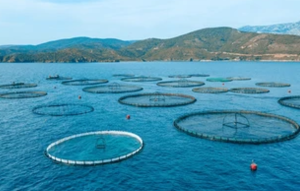
The Benefits of Polyculture: Gilthead Seabream and Safi Fish in Fujairah Waters
The polyculture of gilthead seabream (Sparus aurata) and safi fish (Siganus canaliculatus) is emerging as a sustainable and efficient alternative to traditional monoculture in Fujairah’s aquaculture industry. This approach, led by Omega Farm in collaboration with the Fujairah Research Centre, offers numerous benefits, including improved resource utilization, enhanced water quality, reduced disease incidence, reduced mortality rates, improved growth rates of seabream, and economic diversification.
By integrating these two species, farmers take advantage of their complementary feeding behaviors. Gilthead seabream fish consume small invertebrates, while herbivorous safi fish feed on algae, optimizing resource use and reducing waste. Safi fish also play a vital role in maintaining water quality by controlling algae growth and recycling nutrients, reducing the need for chemical interventions and enhancing environmental sustainability.
Polyculture systems reduce the risk of disease outbreaks, as biodiversity dilutes pathogen loads and supports healthier stocks. Notably, the incidence of Myxozoa (Enteromyxum leei) a disease affecting gilthead seabream, has decreased in such systems. This contributes to lower dependency on antibiotics and more resilient aquaculture operations. Additionally, polyculture has been shown to reduce the mortality rate of gilthead seabream while improving their growth rate, leading to higher overall yields.
Economic risks associated with monoculture, such as price fluctuations or species-specific disease, are mitigated through polyculture. Both gilthead seabream and safi fish are in demand in local and international markets, providing diversified revenue streams. Additionally, this method aligns with Fujairah’s commitment to sustainability by mimicking natural ecosystems and supporting biodiversity.
In regions with limited coastal areas for aquaculture, polyculture maximizes productivity by enabling multiple species to coexist efficiently. As the global demand for seafood rises, this method offers a scalable and sustainable solution. The efforts of Omega Farm and the Fujairah Research Centre demonstrate how polyculture can reduce infections like Enteromyxum leei while paving the way for a thriving, environmentally friendly aquaculture industry in Fujairah and the UAE.
